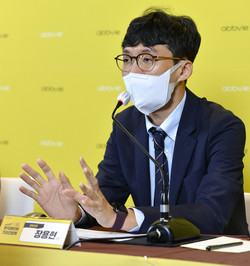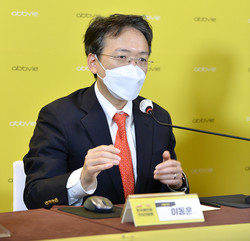AbbVie is strengthening its position in Korea’s atopic dermatitis treatment market with Rinvoq (ingredient: upadacitinib), a Janus kinase (JAK) inhibitor, armed with new clinical data, the company said Tuesday.
The drug recently received approval from the Ministry of Food and Drug Safety for three additional indications -- psoriatic arthritis, ankylosing spondylitis, and atopic dermatitis – aside from the existing one for rheumatoid arthritis. The indication for atopic dermatitis is for treating moderate to severe atopic dermatitis in adults and adolescents over 12 subject to systemic therapy.
Rinvoq has demonstrated efficacy and safety in treating moderate and severe atopic dermatitis through major global phase 3 clinical trials, such as Measure Up1, Measure Up2, and AD Up, which compared Rinvoq with placebo, and a Heads Up study, comparing the treatment directly with Dupixent.
The Heads Up study confirmed that major symptoms related to atopic dermatitides, such as eczema and itching, improved faster and more powerfully than Dupixent up to the 16th week.
At an online media event held by AbbVie Korea on Tuesday, experts evaluated that Rinvoq could be a treatment option for atopic dermatitis patients and partially resolve unmet needs.

"Unlike Dupixent, which completely inhibits only interleukin-4 (IL4) and IL13 in atopic dermatitis involving various cytokines, Rinvoq simultaneously inhibits several cytokines and shows high effects by focusing on key cytokines among JAK treatments," said Professor Jang Yong-hyun of the Department of Dermatology at Kyungpook National University College of Medicine. "Rinvoq selectively inhibits key cytokines and helps alleviate chronic itchiness, improving skin symptoms."
Atopic dermatitis has a complex immunopathological mechanism and varies according to race and age, so it is difficult to suppress only IL-4 and IL-13 as a complete alternative, he said, predicting that Rinvoq would address the unmet needs medical demand that Dupixent failed to cover.
Jang then pointed to another difference between the two medications resulting from their different mechanisms.
"The biologic Dupixent is an injection, while JAK inhibitors like Rinvoq are small molecule inhibitors taken orally," Jang said. "For patients who find it difficult to receive injections at regular intervals, oral medication Rinvoq can be an alternative that enhances patient convenience."
Oral drugs also have the advantage of taking the drug according to the patient's condition because doctors can easily adjust the dosage, Jang added.

Professor Lee Dong-hoon of the Department of Dermatology at Seoul National University Hospital pointed out that another strength of Rinvoq lies in its excellent clinical data.
"In phase 3 clinical trials compared with placebo, the achievement rate of eczema area and severity index (EASI) 75, which means the patient showed at least 75 percent improvement in the eczema severity index compared to the baseline, was 60-70 percent at week 16," Lee said. "Also, the number of patients who reached EASI90 also reached 42-53 percent and about half of the patients significantly improved itching symptoms."
He added that this is more positive than the Olumiant clinical data, another JAK inhibitor developed by Eli Lilly, where about half of phase 3 participants reached EASI75.
Lee pointed out that Rinvoq showed superiority in a direct comparison clinical trial with Dupixent, the current go-to treatment for moderate-severe atopic dermatitis.
"In the phase 3b Heads Up study, the proportion of patients who achieved EASI 75 at week 16 in the Rinvoq group was 71 percent, higher than the Dupixent group's 61 percent," Lee said. "Also, as a result of dividing the patient's lesions into four areas – head and neck, torso, arms, and legs -- and looking at the ratio of achieving EASI 75 at week 16, the ratio that Rinvoq had more number patients that achieved EASI 75 in week 1 compared to Dupixent."
The results showed that Rinvoq could resolve symptoms faster than Dupixent regardless of the affected area, Lee added.
However, Lee said it remains to be seen whether Rinvoq can maintain its effectiveness in long-term use.
"Because Rinvoq blocks important factors in the early phase, the initial efficacy is rapid and clear," Lee said. "On the other hand, Dupixent, which intensively targets a specific cytokine, tends to increase its effectiveness as it slowly affects its surroundings gradually."
Therefore, there needs to be real-world research on how long Rinvoq can last, he added.
Encouraged by favorable assessment, AbbVie Korea officials said they have applied for reimbursement for using Rinvoq in treating atopic dermatitis.
"While most hospitals can prescribe Rinvoq, the company expects that the reimbursement for the drug in treating atopic dermatitis will take some time," AbbVie Korea Medical Director Kang Ji-ho said. "We will speed up discussions with the Health Insurance Review and Assessment Service and the National Health Insurance Service."

